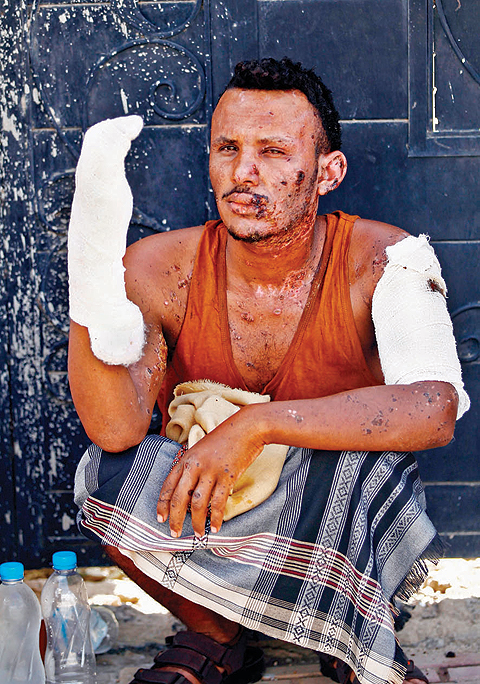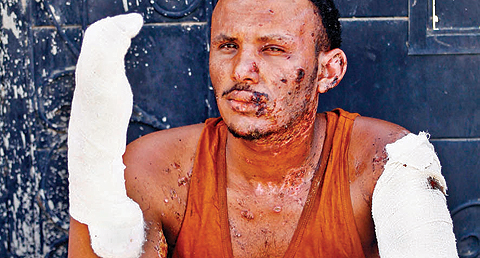Yemen war a 'living hell' for children: UNICEF
 SANAA: An injured Yemeni Houthi rebel fighter sits outside the UN offices in the capital Sanaa during a demonstration with other fighters demanding the right to travel abroad for medical treatment. — AFP
SANAA: An injured Yemeni Houthi rebel fighter sits outside the UN offices in the capital Sanaa during a demonstration with other fighters demanding the right to travel abroad for medical treatment. — AFPWASHINGTON: US Secretary of State Mike Pompeo has "certified" that Saudi Arabia and the United Arab Emirates are working to reduce risks to civilian life in Yemen-a key step to ensuring continued US support to the coalition. Pompeo's assessment, announced Wednesday, came even as he admitted that the US believes civilian death rates at the hands of the coalition are "far too high." Under new rules, Congress requires the certification to continue allowing US air tankers to refuel Saudi and UAE warplanes.
The measure comes amid a string of high-profile coalition strikes that have killed scores of civilians, many of them children. In a statement, Pompeo noted that both Saudi Arabia and UAE "are undertaking demonstrable actions to reduce the risk of harm to civilians and civilian infrastructure resulting from military operations of these governments." On September 1, the coalition admitted that "mistakes" had been made in an August air strike that killed 40 children.
The bombing on a crowded market in part of northern Yemen held by Houthi rebels killed a total of 51 people, according to the Red Cross. In an unclassified report, obtained by AFP, that accompanied Pompeo's certification, he acknowledged that the US "recognizes that civilian casualties have occurred at rates that are far too high in the Saudi-led coalition's campaign in Yemen." The Yemen conflict has triggered the world's worst humanitarian crisis, with the UN estimating that as many as 10,000 people have died, most of them civilians, since the coalition launched military operations in 2015.
Twin strikes south of the rebel-held Red Sea port of Hodeida on August 23 killed 26 children, the United Nations has said. The United States has drawn sharp criticism for its ongoing support to the coalition, which also includes intelligence sharing and targeting information. In the report, Pompeo said civilian casualties must be reduced "for both strategic and moral reasons."
The document points to multiple ways the coalition is trying to do this, including by avoiding hitting civilian infrastructure, keeping a "no-strike" list, and by updating rules of engagement. The Royal Saudi Air Force has also pledged to fund $750 million in US-provided training. The report notes the coalition is engaged in an "urgent and good-faith effort" to support diplomatic efforts to end the war.
'Farce'
But aid groups slammed Pompeo's certification, saying it would ensure further civilian bloodshed. "With Secretary Pompeo's certification, the State Department demonstrated that it is blindly supporting military operations in Yemen without any allegiance to facts, moral code or humanitarian law," Oxfam America said in a statement. Brookings Institution fellow Scott Anderson said Congress must push for more information on the basis of the certification, and challenge Pompeo if this is deemed inadequate.
And Democratic Congressman Ro Khanna called the certification a "farce." "The Saudis deliberately bombed a bus full of children. There is only one moral answer, and that is to end our support for their intervention in Yemen," Khanna said on Twitter. The coalition supports the internationally recognized government of President Abedrabbo Mansour Hadi, which is fighting Iran-backed Houthi rebels who seized control of Sanaa in 2014. US Defense Secretary Jim Mattis issued a separate statement endorsing the certification, saying the UAE and Saudis are making "every effort" to reduce the risk of civilian casualties and collateral damage. Mattis last month warned that US support for the coalition was "not unconditional," noting that the coalition must do "everything humanly possible to avoid any innocent loss of life."
'Living hell' for kids
In the malnutrition ward of a hospital in the Yemeni capital Sanaa, doctors weigh toddlers with protruding rib cages and skeletal limbs. Twenty children, most under the age of two, being treated at the ward in Sab'een Hospital are among hundreds of thousands of children suffering from severe malnutrition in the impoverished country that has been ravaged by a more than three years of war. "The conflict has made Yemen a living hell for its children," Meritxell Relano, UNICEF Representative in Yemen said. She said more than 11 million children, or about 80 percent of the country's population under the age of 18, were facing the threat of food shortages, disease, displacement and acute lack of access to basic social services.
"An estimated 1.8 million children are malnourished in the country. Nearly 400,000 of them are severely acute malnourished and they are fighting for their lives every day." A coalition of Sunni Muslim Arab states, led by Saudi Arabia and the United Arab Emirates, intervened in Yemen's war in 2015 against the Iranian-aligned Houthis after they drove the internationally recognized government out of the capital Sanaa. The war has unleashed the world's most urgent humanitarian crisis in the nation of 28 million, where 8.4 million people are believed to be on the verge of starvation and 22 million people are dependent on aid.
The coalition has imposed stringent measures on imports into Yemen to prevent the Houthis from smuggling weapons but the checks have slowed the flow of commercial goods and vital aid into the country. Saudi Arabia and the UAE say they are providing funds and supplies to support aid efforts in Yemen. The Houthis blame the coalition for choking off imports into the country. In Sab'een hospital a toddler in diapers lay wrapped in blankets with a tube inserted in the child's nose. Another child cried while being lowered naked unto a scale to be weighed.
The families of the children declined to speak to the media. "The situation of the families without jobs, without income and in the middle of the war, is catastrophic," Relano said. She said UNICEF had provided more than 244,000 severely malnourished children under the age of five with therapeutic treatment since the beginning of 2018, in addition to micronutrient treatment to over 317,000 children under five. "The human cost and the humanitarian impact of this conflict is unjustifiable," UN humanitarian coordinator Lise Grande said in a statement yesterday.- Agencies











